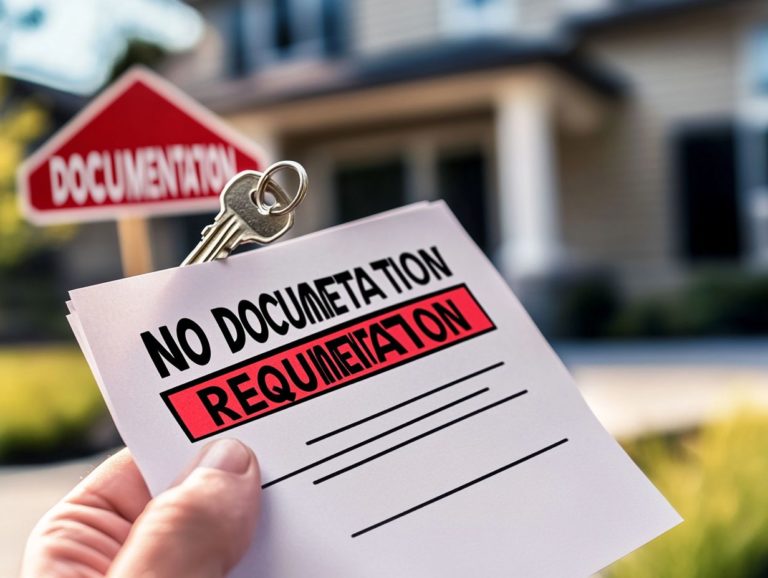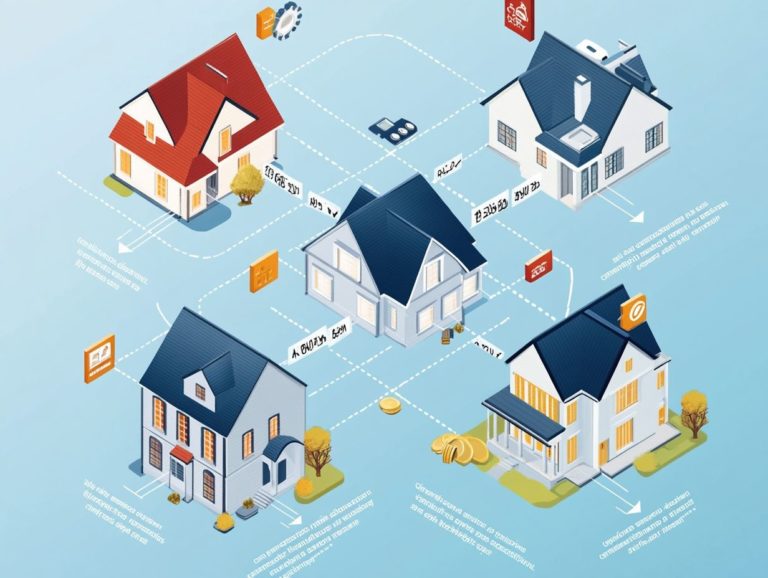Navigating the Mortgage Market in 2024
As you step into 2024, the mortgage market unfolds both challenges and opportunities for you as a prospective homebuyer.
Grasping the latest market trends is vital for making well-informed decisions. Whether you re a first-time buyer or considering refinancing your current mortgage, understanding the landscape is essential.
This article explores the types of mortgages available. It also covers the factors that influence rates and the essential steps for preparing for the mortgage process.
From assessing your finances to navigating the application and closing journey, this guide will explain every step of the way for you.
Contents
- Key Takeaways:
- Understanding the Current Mortgage Market
- Types of Mortgages Available
- Preparing for the Mortgage Process
- Navigating the Mortgage Application and Closing Process
- Frequently Asked Questions
- What is the forecast for the mortgage market in 2024?
- How do I prepare for navigating the mortgage market in 2024?
- Will there be any changes to mortgage regulations in 2024?
- Should I consider refinancing my mortgage in 2024?
- What types of mortgages will be available in 2024?
- How can I get the best interest rate on my mortgage in 2024?
Key Takeaways:

Be aware of market trends when navigating the mortgage market in 2024, as they can impact interest rates and loan options.
Understand the different types of mortgages available, such as fixed-rate vs. adjustable-rate and government-insured vs. conventional, to make an informed decision.
Factors such as economic indicators, credit score, and down payment can affect mortgage rates. It s crucial to prepare financially and maintain a good credit score.
Understanding the Current Mortgage Market
Grasping the nuances of the current mortgage market is crucial for you as a homebuyer or investor. This landscape mirrors the ongoing dynamics of the housing market, shaped by various factors such as mortgage rates, economic conditions, and emerging trends.
Since the 2008 crisis, the mortgage landscape has transformed significantly. This change underscores the importance of these financial assets in today s competitive arena.
By leveraging insights from reputable organizations like the National Association of REALTORS (NAR), you can better understand the complexities impacting both buyers and sellers in this ever-evolving environment.
Market Trends Overview
The overview of market trends in the mortgage sector offers essential insights into current housing dynamics. Factors like inventory shortages and affordability challenges significantly impact homebuyers and their financial plans.
In recent months, the landscape has shifted dramatically. New home sales have risen, driven by increased demand for spacious living arrangements as remote work continues to be the norm.
Meanwhile, existing-home sales are under pressure from low inventory levels, intensifying competition among prospective buyers. Statistics reveal that average home prices have surged, prompting many to reassess their budgets or explore alternative options, such as townhouses or condominiums.
These evolving patterns illustrate the complex interplay between rising interest rates and changing consumer preferences. Staying informed about market fluctuations is vital for anyone looking to navigate this dynamic environment effectively.
Types of Mortgages Available
When contemplating a mortgage, it s essential for you to understand the different types available, such as fixed-rate and adjustable-rate mortgages.
Each option caters to distinct financial obligations and risk appetites. This understanding is vital for both low-income homebuyers and seasoned investors navigating today s competitive housing market.
Fixed-Rate vs. Adjustable-Rate Mortgages
Fixed-rate and adjustable-rate mortgages represent two fundamental choices for you as a homebuyer. Each comes with unique characteristics that impact your financial stability and mortgage rates over time.
A fixed-rate mortgage provides peace of mind, as your interest payments remain unchanged throughout the loan’s life. This stability can be particularly appealing if you value predictability in budgeting.
In contrast, an adjustable-rate mortgage (ARM) often starts with a lower initial interest rate. While this can lead to lower payments at the beginning, the rate can fluctuate, potentially resulting in significant increases later.
As you consider these options, it s crucial to weigh the benefits of stable monthly payments against the risks of potential interest rate hikes with an ARM. These fluctuations could catch you off guard and affect your long-term financial planning, so being informed is key.
Government-Insured vs. Conventional Mortgages

Government-insured mortgages, like FHA loans, offer distinct advantages for low-income homebuyers. They provide an appealing alternative to conventional mortgages, which often have stricter credit requirements and higher down payments.
These government programs are designed to help people buy homes, especially those who face challenges in meeting the rigid criteria set by traditional lenders.
For instance, FHA loans can secure down payments as low as 3.5%. In contrast, conventional mortgages usually require down payments ranging from 5% to 20%. Government-insured loans are also more lenient regarding credit scores, enabling borrowers with imperfect histories to obtain financing.
However, be aware of possible drawbacks, such as higher mortgage insurance premiums that can inflate your monthly expenses. Conventional loans might require a heftier upfront investment and a solid credit profile, but they often come with fewer ongoing fees. This can make them more attractive to those with stable financial situations.
Factors Affecting Mortgage Rates
Several key factors influence mortgage rates, including economic indicators, interest rates, credit scores, and down payments. Each of these factors is important for your financial stability as a potential homebuyer and affects your ability to secure favorable lending terms.
Understanding this interplay can give you the power as you navigate the complexities of the mortgage market.
Economic Indicators and Interest Rates
Economic indicators play a crucial role in shaping interest rates, which ultimately affect mortgage rates and the overall market stability. Decisions made by the Federal Reserve can lead to significant shifts in housing finance dynamics.
By understanding these indicators such as inflation rates and employment statistics you can gain valuable insights into market trends.
For example, when inflation rises, consumers’ purchasing power tends to decline. This often leads the Federal Reserve to increase interest rates to cool the economy. Conversely, low unemployment rates usually indicate a strong economy, driving demand for housing and potentially pushing mortgage rates higher.
As these economic trends unfold, they create a dynamic landscape in the housing market, influencing how buyers and sellers make their financial decisions.
Credit Score and Down Payment
A strong credit score and a substantial down payment are vital for securing favorable mortgage rates. Lenders view these as clear signs of your financial responsibility and stability.
This perspective is crucial because it impacts the total loan amount you can qualify for and the monthly payments you’ll need to manage. Higher credit scores generally lead to lower interest rates, making homeownership more affordable over time.
When you bring a larger down payment to the table, it reduces the lender’s risk. This can lead to better terms and even eliminate the need for private mortgage insurance (PMI), which is insurance that protects the lender if you can’t make your payments.
Understanding these elements boosts your chances of loan approval and gives you the power to make well-informed decisions as you navigate the complex mortgage landscape.
Preparing for the Mortgage Process
Preparing for the mortgage process requires a careful evaluation of your finances and budget. This groundwork is essential for securing a successful pre-approval, a pivotal step for any prospective homebuyer looking to expertly navigate the intricate landscape of housing finance.
Assessing Your Finances and Budget

Assessing your finances and budget is the cornerstone of the mortgage process, allowing you to pinpoint affordability challenges. This ensures you can meet your future financial obligations comfortably.
By carefully evaluating your income sources, such as salaries or bonuses, alongside regular expenses like utilities and groceries, you can gain a comprehensive understanding of your financial landscape.
It’s crucial to track both fixed costs, such as mortgage payments and property insurance, as well as variable expenses, like maintenance and unexpected repairs.
Incorporating your savings goals into this equation will create a well-rounded budget that prepares you for unforeseen circumstances.
This approach highlights areas where you can trim spending. It also underscores the importance of establishing a safety net for emergencies, ultimately leading to more informed financial decisions.
Getting Pre-Approved for a Mortgage
Getting pre-approved for a mortgage is a crucial step for you as a homebuyer. It demonstrates your financial stability to sellers. It helps you understand what you can afford in the current housing market.
The journey begins when you submit a formal application to a lender. Here, you’ll provide personal financial details. The lender will then evaluate your credit scores, income, and the amount you owe compared to what you earn to determine your eligibility for specific loan amounts.
By securing a pre-approval letter, you gain confidence in your purchasing power. It bolsters your position when negotiating offers on properties. This smart move can speed up your closing process, getting you into your new home faster!
Navigating the mortgage application and closing process demands careful attention. By understanding the essential steps and required documents, you set the stage for a more transparent transaction. This ensures a smoother experience as a homebuyer.
Key Steps and Documents Required
The key steps and documents you need for a successful mortgage application include various financial statements, proof of income, and identification. All are essential for meeting your financial obligations and ensuring transparent transactions.
This process starts with gathering crucial documents like recent pay stubs, W-2 forms, and tax returns. These showcase your earning capacity and financial stability.
Lenders will also want to see your bank statements to evaluate your savings and checking account balances. This gives them a clearer picture of your overall financial health. Personal identification, such as your driver s license or passport, is critical for verifying your identity.
Next, you’ll need to complete a loan application that outlines your financial history and the loan amount you’re seeking. These steps not only streamline the approval process but also prepare you for the financial commitment that comes with homeownership.
Understanding Closing Costs and Fees
Knowing your closing costs and fees is crucial for every homebuyer, as these expenses can significantly influence your overall financial strategy when finalizing a mortgage application.
These costs typically include various components such as appraisal fees, title insurance, and loan origination fees. All are crucial for ensuring a seamless mortgage transaction.
Don’t forget about ongoing costs, such as property taxes, homeowners’ insurance, and potentially mortgage insurance. These can have a substantial impact on your cash flow and budgeting.
It’s important to recognize that these costs can vary based on your geographical location and the lender s policies. Therefore, conducting thorough research and consulting your mortgage advisor is vital for gaining a clear understanding of what to expect during the closing process.
Frequently Asked Questions

What is the forecast for the mortgage market in 2024?
Experts expect steady growth in the mortgage market for 2024. However, it is important to keep in mind that the forecast can change based on economic factors.
Start by assessing your financial situation and credit score. Stay updated with market trends and seek advice from a financial advisor or mortgage broker.
Will there be any changes to mortgage regulations in 2024?
Changes to mortgage regulations are likely in 2024, as they are always evolving. Stay informed about potential changes that could affect your ability to secure a mortgage.
Should I consider refinancing my mortgage in 2024?
It’s wise to review your mortgage regularly. If refinancing makes financial sense for you, evaluate the current market and your personal finances before deciding.
What types of mortgages will be available in 2024?
In 2024, expect to see similar mortgage types, like fixed-rate and adjustable-rate mortgages. New options could emerge, so keep yourself informed.
How can I get the best interest rate on my mortgage in 2024?
Secure the best interest rate by having a strong credit score, stable income, and low debt relative to your income. Shop around and compare lenders to find the best deal!






